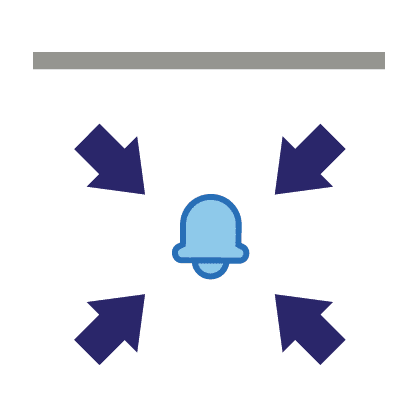Benefits of Virtual Sitting
& AI for Reducing Falls

With advanced technology, healthcare facilities are discovering the transformative potential of leveraging virtual sitter solutions and artificial intelligence (AI) for reducing patient falls. Reducing falls in a hospital setting is of paramount importance due to its significant impact on patient safety, well-being, and overall healthcare outcomes. To help reduce falls healthcare facilities have implemented virtual sitter solutions that monitor patients remotely by leveraging cameras, sensors, and communication systems. AI adds an additional layer of support through pattern recognition, alert generation, and real time data processing. When combined these powerful advancements provide a multitude of benefits to improving patient safety and assisting in the prevention of falls.

Reduced workload
By continuously monitoring patients, AI can identify subtle changes in behavior or mobility patterns that may indicate a risk of falling. This proactive approach not only reduces the burden on healthcare staff but also allows them to prioritize their tasks more effectively. Virtual sitter solutions and AI are very impactful for reducing the effects of staff shortages.

Enhanced patient care
By automating the surveillance and alert system for fall prevention, these technologies alleviate the need for constant, vigilant monitoring, freeing clinicians to engage more deeply with their patients. This newfound time enables healthcare professionals to have meaningful interactions, attentively assess patient needs, answer questions, and provide emotional support. Moreover, clinicians can devote additional energy to developing personalized care plans and exploring innovative treatments, ultimately leading to a higher quality of care and improved patient outcomes. In this way, AI-driven virtual sitters empower clinicians to focus on what truly matters in healthcare: the well-being and comfort of their patients.

Early Intervention
AI’s remarkable ability to swiftly detect changes in a patient’s condition, such as increased heart rate or irregular breathing, plays a pivotal role in advancing patient care. Through continuous monitoring and real-time data analysis, AI algorithms can recognize subtle physiological deviations that might go unnoticed by human observation alone. This early detection capability allows medical staff to intervene promptly, potentially preventing complications or emergencies. By notifying healthcare professionals of these critical changes, AI not only enhances patient safety but also streamlines response times, ensuring that the right interventions are administered at the right moment.

Cost savings
Traditional sitter services can be resource-intensive, requiring round-the-clock staffing and considerable labor costs. AI virtual sitters offer a cost-effective alternative, as they can monitor multiple patients simultaneously without fatigue, breaks, or overtime pay. This not only decreases personnel expenses but also minimizes the administrative overhead associated with managing sitter schedules and staffing fluctuations. Moreover, the ability of AI to proactively prevent falls and alert staff, when necessary, helps prevent costly medical complications and litigation, further contributing to substantial long-term cost savings for healthcare facilities.

Reduced alarm fatigue
AI-powered virtual sitters offer a significant advantage in reducing alarm fatigue, a common challenge in healthcare settings. Traditional alarm systems often inundate healthcare staff with frequent false alarms, which can desensitize them to critical alerts and compromise patient safety. AI-driven virtual sitters mitigate this issue by employing advanced pattern recognition and data analysis techniques, leading to more precise and context-aware alarm generation. This means that alarms are triggered only when there is a genuine cause for concern, reducing the number of false alarms significantly. As a result, healthcare professionals can respond more attentively to alarms, knowing that each one carries genuine clinical relevance.

Privacy and Dignity
Virtual sitters not only enhance patient safety but also uphold the principles of privacy and dignity in healthcare. These AI-powered solutions offer patients a level of autonomy and personal space that may be compromised with constant physical monitoring. Patients can feel more at ease knowing they are not constantly under direct observation, which can be especially important for individuals seeking privacy during personal moments or sensitive procedures. Virtual sitters maintain vigilance from a discreet distance, respecting patients’ need for privacy and preserving their dignity.

Data collection and analysis
Virtual sitters with AI capabilities offer a valuable advantage in data collection and analysis within healthcare settings. These systems continuously gather a wealth of patient data over time, including movement patterns, vital signs, and behavioral cues. The power of AI lies in its ability to sift through this vast amount of information, identifying subtle patterns and trends that may not be immediately apparent to human observers. This data-driven approach enables healthcare professionals to make more informed and personalized care decisions.


